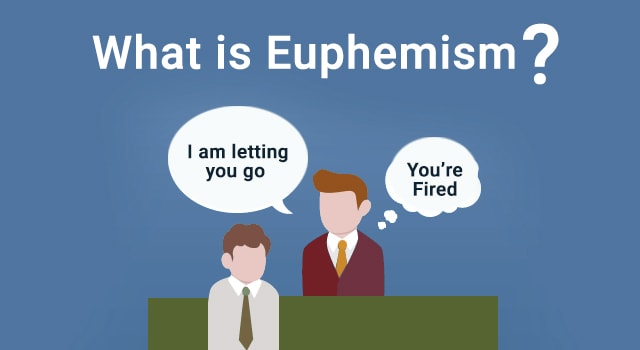• Euphemism is a mild substitute for a harsh or rude expression. • कठोर शब्दों के स्थान पर मधुर भाषा का प्रयोग करना ही यूफमिज़म है। यदि आपको कोई ऐसी बात कहनी है जिसे कहने से सामने वाले को दुःख पहुँच सकता है या आपके शब्द offensive लग सकते हैं तो उसी बात को कोमल तरीके से कहने के लिए euphemisms का प्रयोग किया जाता है । Euphemism comes from the Greek word 'euphemia', meaning "the use of words of good omen". There are certain words and phrases in the English language that comes with a negative connotation and should not be used in a polite conversation. For example: • You look fat. • Her mother died. • His brother is a retard. Sounds a bit rude, right? अब सवाल है की इन rude words को कैसे avoid किया जाए? जवाब है EUPHEMISM. When to use the euphemisms? EUPHEMISMS can be used in following situations: • When you need to downplay a sad emotion. ( किसी दुखद भाव को कम करके बताना ) ⇒ My uncle passed away. Pass away = euphemism for death. • When you want to convey those ideas which have become a social taboo. ( ऐसे विचारों को व्यक्त करना जो की एक सामाजिक वर्जना बन चुके हैं ) ⇒ They broke up because John was sleeping with his secretary. Sleeping with someone = euphemism for a sexual act. • If something is too embarrassing to mention directly. ( अगर किसी भी बात का सीधे शब्दो में उल्लेख करना उचित न लगे ) ⇒ You are becoming a little thin on top. Thin on top = euphemism for bald.
Ways to create or use Euphemisms: • Deliberate mispronunciation किसी शब्द का मिलता-जुलता परन्तु जानबूझ कर गलत उच्चारण करना। Damn = Darn, Oh shit = Oh shoot • Idiomatic expressions परिस्थिति के हिसाब से असल वाक्य के स्थान पर मुहावरा कह देना। Kick the bucket = To die • Foreign words किसी दूसरी भाषा के शब्दों का प्रयोग करना। faux = fake, faux pass = a foolish mistake • Using longer words or expressions ज़्यादा और कठिन शब्दों में कहना। visually impaired = blind, perspiration = body odor
 THE MOST COMMONLY USED EUPHEMISMS
• A special child = a mentally underdeveloped child (मानसिक रूप से विकलांग बच्चा)
• Always tired and emotional = a drunk person (हमेशा शराब के नशे में रहने वाला व्यक्ति)
• Someone who is between jobs = someone who is jobless (बेरोज़गार होना)
• Full-figured = an obese person (मोटा व्यक्ति)
• In the family way or expecting = to be pregnant (गर्भवती होना)
• Domestic help = house servant or maid (घर में काम करने वाला नौकर)
• Couch potato = lazy person (आलसी)
• Letting someone go = to fire someone (नौकरी से निकालना)
• Over the hill = for someone who is above the age of 50 or 60 (बुढ़ापे की और बढ़ता हुआ व्यक्ति)
• Someone who is economical with the truth = a liar (झूठ बोलना या झूठा इंसान)
• Correctional facility = jail or prison (कारागार)
• Adult beverage = liquor (मदिरा)
• To spend a penny = an excuse to go the toilet (बाथरूम जाने के लिए एक polite excuse)
• On the streets = homeless (बेघर)
• Underprivileged, economically disadvantaged = poor (गरीब/निर्धन)
Next time, before you say something unpleasant, take a moment and euphemise your words.
To learn more such new things about English conversation skills, download our application Namaste English.
THE MOST COMMONLY USED EUPHEMISMS
• A special child = a mentally underdeveloped child (मानसिक रूप से विकलांग बच्चा)
• Always tired and emotional = a drunk person (हमेशा शराब के नशे में रहने वाला व्यक्ति)
• Someone who is between jobs = someone who is jobless (बेरोज़गार होना)
• Full-figured = an obese person (मोटा व्यक्ति)
• In the family way or expecting = to be pregnant (गर्भवती होना)
• Domestic help = house servant or maid (घर में काम करने वाला नौकर)
• Couch potato = lazy person (आलसी)
• Letting someone go = to fire someone (नौकरी से निकालना)
• Over the hill = for someone who is above the age of 50 or 60 (बुढ़ापे की और बढ़ता हुआ व्यक्ति)
• Someone who is economical with the truth = a liar (झूठ बोलना या झूठा इंसान)
• Correctional facility = jail or prison (कारागार)
• Adult beverage = liquor (मदिरा)
• To spend a penny = an excuse to go the toilet (बाथरूम जाने के लिए एक polite excuse)
• On the streets = homeless (बेघर)
• Underprivileged, economically disadvantaged = poor (गरीब/निर्धन)
Next time, before you say something unpleasant, take a moment and euphemise your words.
To learn more such new things about English conversation skills, download our application Namaste English.



